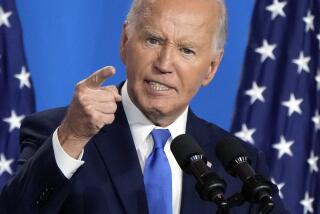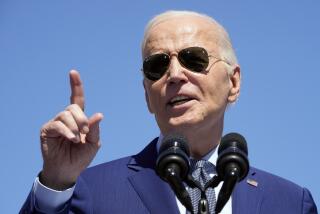High Negative Rating Forces Bush to Attack
- Share via
NEW ORLEANS — Anyone who has watched TV news or read a newspaper lately has probably heard about them: They’re the messy, unwanted things Vice President George Bush picked up somewhere and can’t get rid of--the political equivalent of chewing gum on his shoe.
They are George Bush’s “high negatives,” political pollsters’ jargon for the rude fact that more than 40% of Americans say there is just something about George Bush they do not like.
And those polling numbers are turning the 1988 campaign into the most aggressively negative presidential race in recent memory because political professionals believe such campaigning is almost the only way Bush can win.
Right now, the vice president’s negative ratings are at record-breaking levels--far higher than even the Rev. Jesse Jackson’s were earlier this year and 20 percentage points higher than Walter F. Mondale’s when he was annihilated in 1984.
“A negative view that relates to someone’s personality is awfully hard to change,” said California pollster Mervin Field. “The only way to change is to refocus the race away from Bush as a person . . . and try to make sure the blank page on Dukakis gets filled in with negative information.”
Although so-called “horse race” polls--asking which candidate would win if an election were held today--traditionally get more headlines, political professionals consider survey findings on candidates’ “negatives” to be far more important in assessing the state of a campaign and planning tactics.
Indeed, these findings--sometimes called favorability ratings--have become the mystical numerals of politics, the data that strategists in both parties and at all levels consider vital in plotting their moves. This is because horse race numbers can be highly volatile, especially at the early stages of a race, but change comes very slowly in voters’ impressions of personality, style, manners and all the other things that, together, form their overall favorable/unfavorable opinion about a candidate.
Strategies Altered
And, once a candidate’s negatives rise to a certain level, it drastically alters what strategies will help win the election, like a football team that falls so far behind its only chance is the long pass.
“I have never known a candidate to win whose negatives were over 40%,” said Democratic pollster John Russonello. “Once you get to the point of 35%, you are in the danger zone of being unelectable.”
Basically, favorability is measured by pollsters with some variant of one simple question: What is your impression of Candidate X--favorable or unfavorable?
Often, pollsters then follow up that question by asking what it is that people like or dislike. This polling technique, in which people are asked open-ended questions rather than multiple-choice questions, can often become the key to a successful campaign strategy, for it can offer insight into what tactics are working and what are not.
“Frequently, it is an essence, the way he comes across, as much as it is something in particular about a person,” Democratic pollster Harrison Hickman said.
Basic Feelings Important
Negatives are considered especially important in a presidential election because, when it comes to choosing a chief executive, voters’ basic feelings about the candidates tend to be more important than issues and other factors--except in the most unusual circumstances.
Of course, Bush strategists will do their best to help the vice president make a more positive impression on voters, and the GOP convention offers a priceless opportunity to persuade millions of Americans to reconsider their opinions.
Yet many professionals are convinced Bush’s own negatives are so large--and so hard to reduce--that his only hope is to drive up the negatives of his opponent.
Surveys of voters’ feelings show Bush is the most unpopular presidential nominee in the 25 years since pollsters began measuring such things. “We really have got ourselves in a hell of a hole,” conceded a Republican pollster, who refused to be named.
In the case of Democratic nominee Michael S. Dukakis, Bush strategists are expected to emphasize certain issues on which they believe Dukakis is too liberal for the tastes of many voters.
Dukakis Remaining Vague
That is one reason, in turn, why Dukakis is trying to remain as vague as possible on many issues, to pick up support from those who dislike Bush and avoid giving voters a reason to dislike him.
And, with negatives in what may be the zone of unelectability, Bush, on the eve of his convention, is a long shot to win regardless of how close he gets in the horse race poll.
“We have got to take major corrective means” at the convention “or the race could be over,” Republican pollster Lance Tarrance said. “If a negative image lies around too long, it develops intensity, almost like a tropical storm.”
According to pollsters involved with both presidential campaigns and also to some who have surveyed voters’ opinions on Bush in the course of planning campaigns for state candidates, three factors consistently show up that make Bush unpopular.
Perceived as Non-Leader
--Bush is “perceived as weak,” a non-leader, Tarrance said. Here, the perennial view of a vice president as a subservient figure is reinforced in Bush’s case by his personality, his voice, his physical mannerism, his tendency toward malapropisms and other factors.
--”A lot of negatives that people attach to the Administration seem to stick to Bush,” said Republican pollster Linda DiVall. Those frustrated by recent crises in the Administration still like Ronald Reagan but tend to blame Bush, polls disclose, and many people also are hankering for change after eight years.
--Many people feel that the prep school- and Yale-educated son of a patrician Connecticut millionaire is out of touch with common concerns.
A key question in examining these negative ratings is who holds them. If only liberal Democrats disliked Bush, his negative ratings might not hurt him. Unfortunately for Bush, poll research--including some conducted by the Los Angeles Times--suggests Bush is not especially well liked by the conservative Democrats who voted for Reagan either, and that is precisely the group that the Republicans must woo.
What does all this suggest about what Bush can do?
Dragging Rival Down
There is surprising agreement among political professionals on this, in part because of the overwhelming sense that, once a candidate becomes too unpopular, he can only win by dragging the other fellow down, too.
That is exactly the kind of campaign political professionals in effect believe Bush must conduct now. In fact, it appears he has already started to do so.
“There is so much inherent resistance to voting for Bush,” said Democratic media consultant Phil Friedman, his only option is “to so clearly define the differences between himself and Michael Dukakis that he can get the votes of people who don’t like him.”
The risk to Bush of such a strategy, Democrats say, is that attacking tends to solidify the negative impression people already have of a candidate, “particularly because the press usually describes you as running a negative campaign out of desperation,” Friedman said.
Attacks by Surrogates
One way of avoiding this is to have popular surrogates such as Reagan himself do the criticizing, as he did Friday, when he asked rhetorically whether Americans really wanted “to risk their future on a blind date,” meaning the little-known Dukakis.
Others are expected to attack Dukakis aggressively at this week’s convention.
“There is a negative growth potential for Dukakis,” Democratic political consultant Carter Eskew conceded. “His support is not rock solid.”
As for Dukakis, key campaign aides said he has decided on a strategy of trying to appear positive and presidential while letting surrogates try to reinforce Bush’s negatives.
That strategy, employed at the Democratic convention, is based on the fact that negative images tend over time to solidify. Once audiences have formed a negative impression, they tend to see in events things that will reinforce or justify their opinions.
So, without having to offer elaborate explanations, Democrats can allude to characteristics in Bush that they know are areas of weakness and thereby reinforce them. Thus were born such lines at the Democratic convention as “Where was George?” and “He was born with a silver foot in his mouth.”
There are a few moments in a campaign when Bush can make strides, strategists said. The debates scheduled for this fall are such moments--dramatic events at which he can make direct comparisons with Dukakis and, potentially, moments of conflict in which he can work on the wimp image.
The convention week just ahead offers equally valuable opportunities.
“A convention offers one of those rare opportunities where he can get his negatives down rather than just build his opponent’s negatives up,” said pollster Peter Hart, who did polling for the Democrats before their convention.
“There are a few times during a campaign when voters seem to suspend judgment and simply ask what is this man like and what does he bring. A convention acceptance speech is just one of those moments.”
More to Read
Get the L.A. Times Politics newsletter
Deeply reported insights into legislation, politics and policy from Sacramento, Washington and beyond. In your inbox twice per week.
You may occasionally receive promotional content from the Los Angeles Times.










